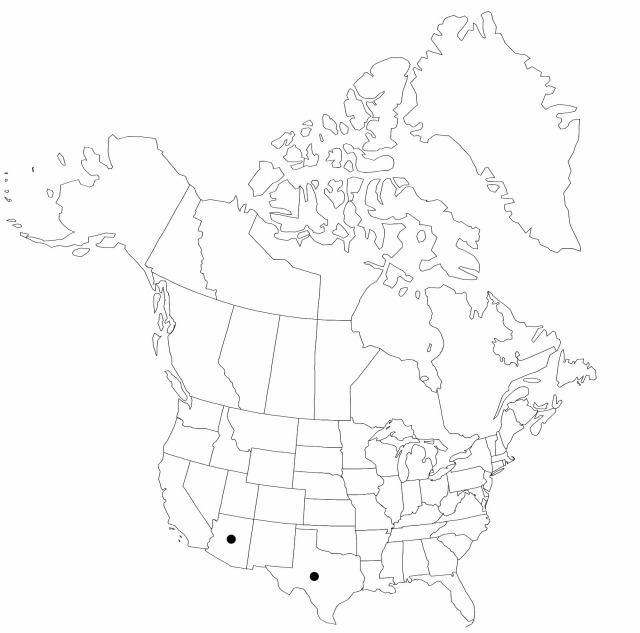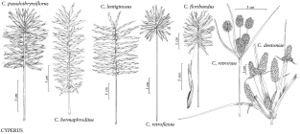Difference between revisions of "Cyperus hermaphroditus"
Contr. U.S. Natl. Herb. 18: 88. 1916.
FNA>Volume Importer |
FNA>Volume Importer |
||
| Line 14: | Line 14: | ||
|name=Mariscus hermaphroditus | |name=Mariscus hermaphroditus | ||
|authority=(Jacquin) C. B. Clarke | |authority=(Jacquin) C. B. Clarke | ||
| − | }}{{Treatment/ID/Synonym | + | }} {{Treatment/ID/Synonym |
|name=Mariscus jacquinii | |name=Mariscus jacquinii | ||
|authority=Kunth | |authority=Kunth | ||
| Line 32: | Line 32: | ||
|elevation=500–1200 m | |elevation=500–1200 m | ||
|distribution=Ariz.;Tex.;Mexico;West Indies;South America. | |distribution=Ariz.;Tex.;Mexico;West Indies;South America. | ||
| − | |discussion=<p>An erroneous report of Cyperus hermaphroditus from Alabama was based on misidentification of C. thyrsiflorus.</p> | + | |discussion=<p>An erroneous report of <i>Cyperus hermaphroditus</i> from Alabama was based on misidentification of <i>C. thyrsiflorus</i>.</p> |
|tables= | |tables= | ||
|references= | |references= | ||
| Line 56: | Line 56: | ||
|publication year=1916 | |publication year=1916 | ||
|special status= | |special status= | ||
| − | |source xml=https://jpend@bitbucket.org/aafc-mbb/fna-data-curation.git/src/ | + | |source xml=https://jpend@bitbucket.org/aafc-mbb/fna-data-curation.git/src/8f726806613d60c220dc4493de13607dd3150896/coarse_grained_fna_xml/V23/V23_319.xml |
|genus=Cyperus | |genus=Cyperus | ||
|subgenus=Cyperus subg. Cyperus | |subgenus=Cyperus subg. Cyperus | ||
Revision as of 17:07, 18 September 2019
Herbs, perennial, rhizomatous. Culms trigonous, (10–)30–80(–140) cm × (0.4–)1–3(–5) mm, glabrous. Leaves V-shaped or flanged V-shaped, (5–)15–70(–90) cm × (2–)4–10(–13) mm, glabrous. Inflorescences: spikes 1(–5), rather densely ovoid or oblong-cylindric, (10–)25–45(–62) × 7–22 mm, 11–21 spikelets per 5 mm of rachis; rays (3–)5–10(–17), (1–)5–12(–24) cm; bracts (2–)4–8, ascending at 30–45°, V- or inversely W-shaped, (2–)8–40(–65) cm × (1–)2–8 mm; rachilla deciduous, wings 0.4–0.5 mm wide. Spikelets (10–)50–150, oblong to linear, quadrangular, (3–)4–8(–18) × (0.8–)1–1.2(–1.6) mm; distal spikelet spreading or ascending; floral scales (1–) 3–8, pale greenish white to golden brown, deep brown, or reddish brown, medially usually green, weakly to strongly 3(–4)-ribbed laterally, 1–3-ribbed medially, ovate to elliptic, (2–)2.6–3.2(–4) × 1.2–2 mm, apex obtuse. Flowers: anthers (0.4–)0.6–1 mm; styles 0.4–1.6 mm; stigmas 1–1.5 mm. Achenes brown or reddish brown, sessile or nearly so, ellipsoid, 1.4–1.8(–2) × 0.6–0.8(–1) mm, apex acute to obtuse, slightly apiculate, surfaces puncticulate.
Phenology: Fruiting summer–fall.
Habitat: Arroyos
Elevation: 500–1200 m
Distribution

Ariz., Tex., Mexico, West Indies, South America.
Discussion
An erroneous report of Cyperus hermaphroditus from Alabama was based on misidentification of C. thyrsiflorus.
Selected References
None.
